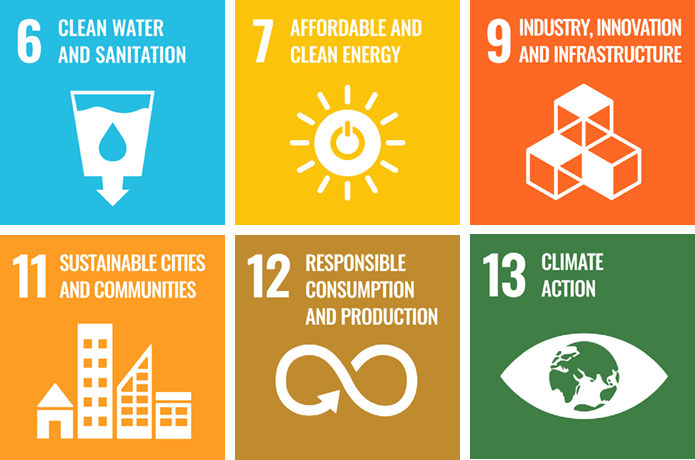
Sustainability theme area
Goals
The goal of TAMK's sustainability theme area is a carbon-neutral and resource-efficient society. Our ambitious vision is decoupling from fossil value chains towards a bio-circular economy.
The theme area combines TAMK's expertise in energy, materials, design, digitalisation, business, and management. This enables multidisciplinary projects, the development of large entities, and new opportunities for innovation.
The impact of RDIC work carried out in ecosystems and networks consists of promoting ecological, economic, and social sustainability regionally, nationally, and internationally.
The focus areas of our RDIC activities
Material revolution and forest bioproducts
We have a strong expertise in sustainable forest bioproducts (pulp, paper, cardboard) and a long history of collaboration with the chemical forest industry. The RDIC projects focus on circular solutions in paper making, biobased solutions in packaging and biodegradability.
Value chains and consumer engagement
We have a strong packaging expertise and special interest in the role of the consumer in the packaging value chain. The consumer plays an important role in developing the EU's key value chains towards a circular economy and in achieving the EU's recycling targets.
Smart and sustainable textiles
In the field of responsible and smart textiles, we focus on new materials, technical textiles, measuring the quality of textiles, sustainable nonwovens, and sustainable smart textiles. Solving the challenges of responsibility and the circular economy is an acute global problem, and significant investments are made at the European level to solve it.
Sustainability in forest management and digital solutions
Our strength lies in the practices of sustainable forest management, which ensure responsible forest harvesting, conservation of biodiversity and maintenance of the health of forest ecosystems. Development is also taking place in utilising data and digital applications in sustainable forest management.
Smart energy transition on energy systems
We have a strong expertise on technological solutions for smart energy transition. Several research projects are currently running or have recently been carried out dealing with smart power control of weather-dependent renewable production and energy storage, converter and inverter drives of electric power transmission, hydrogen technologies and virtual inertia.
Applied research infrastructure
We work in the following laboratories and living labs:
- Paper and packaging laboratory
- Textile laboratory
- Chemistry and environmental laboratory
- Process automation laboratory
- 3D-printing facilities at FieldLab
- Barrier testing laboratory at Tampere University
- Electric power engineering laboratory including modern DC equipment with appropriate converter and inverter drives and energy storages for different demonstrations of smart energy transition. Equipment for the hydrogen economy will be constructed during 2024 and 2025.

Key projects
VETY-tekno (2024–2027)
VETY-tekno is an experimental research project in which a mobile hydrogen economy experimental laboratory is planned and implemented. The aim is to solve the technical business-oriented challenges of the hydrogen economy.
SYNTI (2024–2025)
Solutions for synthetic inertia in distributed power grids is a dynamic modeling project in which, in cooperation with XAMK, we develop the possibilities of using direct current sources (energy storages, wind power, photovoltaics) to support the power grid like traditional electricity generation based on synchronous generators.
LIFE-BECKON (2022–2025)
LIFE-BECKON strengthens the deployment of energy communities across Europe. It develops training content to meet competence needs and comprehensive support mechanisms for e.g. authorities, developers and local practitioners. The content will be piloted in the project's three Living Lab areas, namely Copenhagen, Avila and Sofia.
EduSTA Academy for Sustainable Future Educators (2022–2025)
EduSTA is Finland's first Erasmus+ Teacher Academies project. It develops digital badges and pedagogical processes to support teachers' sustainability expertise. TAMK leads a consortium with partners from the Netherlands, Spain, the Czech Republic and Sweden. The project has attracted a great deal of international interest, as digital badges are considered an impressive way to strengthen teachers' sustainability expertise.
SUSTAFIT (2022–2024)
SUSTAFIT – sustainable fit-for-purpose nonwovens develops solutions for replacement of unsustainable processes and materials of nonwovens with more environmentally friendly ones. The aim is to improve the aspects of quality, cost-effectiveness, and range of applications, with the goal to increase the market share of sustainable nonwovens.
Smart Controls for the Electric Drives of Energy Transformation (2021– 2023)
The project planned and implemented smart controls for the modern electric drives for the energy transformation, in which energy storage and renewable forms of electricity generation play a significant role. The steering needs were mainly company driven.
Impact of our projects
Publications
Partners and networks
Sustainable Development Goals
In particular, we promote the following UN Sustainable Development Goals:

- Goal 6: Ensure availability and sustainable management of water and sanitation for all
- Goal 7: Ensure access to affordable, reliable, sustainable and modern energy for all
- Goal 9: Build resilient infrastructure, promote inclusive and sustainable industrialization and foster innovation
- Goal 11: Make cities and human settlements inclusive, safe, resilient and sustainable
- Goal 12: Ensure sustainable consumption and production patterns
- Goal 13: Take urgent action to combat climate change and its impacts
Become our partner
We want to promote sustainability together with our partners and we hope you are interested in working with us. Collaboration can take place in a research and development project, in the development of teaching, by sharing innovations and best practices and having joint events and campaigns. Let's work together to promote sustainability and make a better future!





